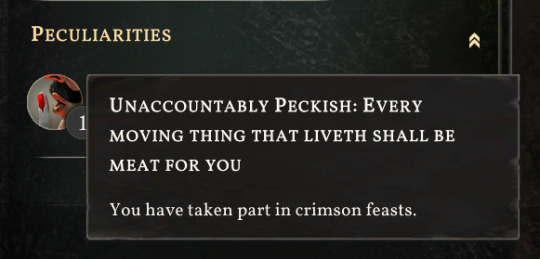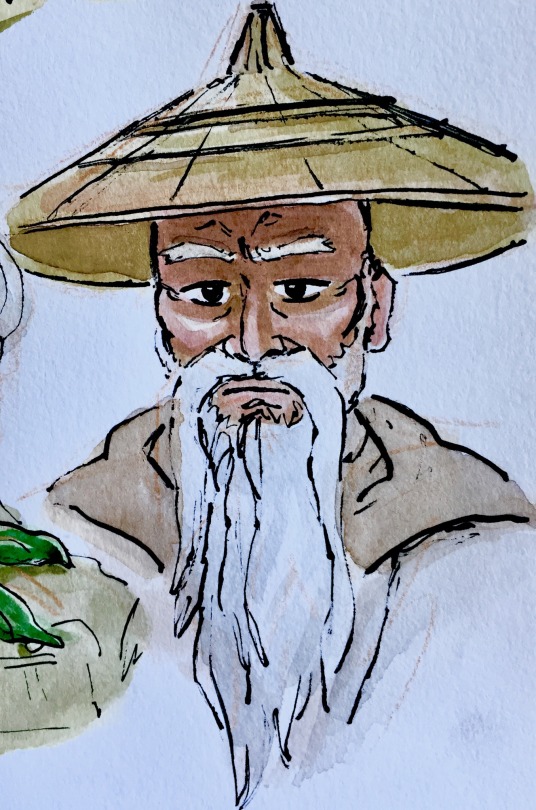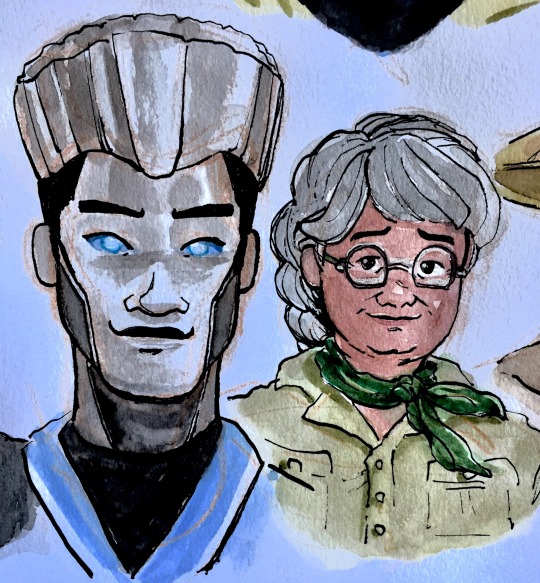#unaccounted for
Explore tagged Tumblr posts
Text
here's some silly villain art stuffs I did over these past few days that i forgot to post





the 1st img is a concept of like, when they resurrect Sa'turnus and he enters the Magic World again, the 2nd is a concept of the different symbols for different main factions (Lightbringers being the MCs and everyone else being villains). The 3rd and 4th are a new oc, idk much ab him other than he might be Sa'kul's brother and leads the "Order fo the Blood Moon". The 5th is another Sa'kul design lol/
#ive been. so full of ideas godbless#raine's art#warriors of light#oc: sa'turnus#oc: sa'kul#unaccounted for
34 notes
·
View notes
Text
exceeding all parody, I slipped on one belt while trying to fasten another, which hurt because I tried to regain my balance and stamped down on an entirely different third belt
2K notes
·
View notes
Text

“Feeding and checking on two animals a couple of times a day is hardly a chore for you. Meanwhile, I've got to deal with a sexist and—even worse—a stupid piece of koalasloth dung.”
“Still not my problem.”
“I'll make it your problem,” she growls.
She wanted murder. He needed sleep.
Technically, the scene this dialogue is from doesn't match the artwork, but the vibe is most important! Their banter must be one of my favorite things about Itch, Akai Kotou's second chapter (read it here!). The dynamic between Suki and Jian Li is terribly amusing, isn't it?
#atla#avatar the last airbender#zuko#atla fanart#prince zuko#atla art#Akai Kotou#kyoshi warriors#kyoshi island#Kyoshi Warriors AU#Kyoshi Warrior Ursa AU#Kyoshi Warrior Zuko#Kinda. It's not official.#atla zuko#zuko art#zuko fanart#Jian Li#suki fanart#suki art#atla suki#suki#Zuki bromance gogogo#i love them so so so so so so so much#And they love each other too but—damn it Sukes! Let my boy get some sleep. A man needs his rest :(#The sass is unaccounted for in this fic I swear#So much banter going on#Akai Kotou Chapter II: Itch#Jian Li's real identity was never a secret but may Agni strike me down where I stand if I don't drop subtle hints about it anyway#Yes this is about Katara describing his face as “beautiful and marred” and then this chapter's insane levels of subtext#Someone save me from Zuko's angst. It's taking over a fluffy AU.
509 notes
·
View notes
Text



max tries several unimpressive new tactics
#my art#fanart#paranatural#maxwell puckett#johnny jhonny#gaslighting#???#unreality#?????#ASK TO TAG. THIS ONE IS A LITTLE DARK MAYBE#ive wanted to draw this ever since i heard a super high mirakirutaimu say ''don't you gaslist me'' during like among us#and suddenly spontaneously unaccountably found the motivation today#just when i thought i was out they pull me back in.
412 notes
·
View notes
Text











Spud Hut: A Smosh Sitcom
#chanse mccrary#angela giarratana#ian hecox#shayne topp#amanda lehan canto#arasha lalani#damien haas#trevor evarts#tommy bowe#smosh#smgifs#spud hut#Aunt Carolyn#augustus st cloud#jerry spruce#since coroner arasha appeared and we know keith and olivia is in the next episode#we had sarah christ with the coroner in a post but that could be because of the bit city ep being shot at the same time#we still have a potential detective wesma kofi appearance unaccounted for#also this must be the mysterious project they were talking about in Smosh mouth#tater#frite
296 notes
·
View notes
Text
Tech’s benevolent-dictator-for-life to authoritarian pipeline

If you'd like an essay-formatted version of this post to read or share, here's a link to it on pluralistic.net, my surveillance-free, ad-free, tracker-free blog:
https://pluralistic.net/2024/12/10/bdfl/#high-on-your-own-supply

Silicon Valley's "authoritarian turn" is hard to miss: tech bosses have come out for autocrats like Trump, Orban, Milei, Bolsonaro, et al, and want to turn San Francisco into a militia-patrolled apartheid state operated for the benefit of tech bros:
https://newrepublic.com/article/180487/balaji-srinivasan-network-state-plutocrat
Smart people have written well about what this means, and have gotten me thinking, too:
https://www.programmablemutter.com/p/why-did-silicon-valley-turn-right
Regular readers will know that I make a kind of hobby of collecting definitions of right-wing thought:
https://pluralistic.net/2021/09/29/jubilance/#tolerable-racism
One of these – a hoary old cliche – is that "a conservative is a liberal who's been mugged." I don't give this one much credence, but it takes on an interesting sheen when combined with this anonymous gem: "Conservatives say they long for the simpler times of their childhood, but what they miss is that the reason they lived simpler lives back then wasn't that the times were simpler; rather, it's because they were children."
If you're a tech founder who once lived in a world where your workers were also your pals and didn't shout at you about labor relations, perhaps that's not because workers got "woke," but rather, because when you were all scrapping at a startup, you were all on an equal footing and there weren't any labor relations to speak of. And if you're a once-right-on tech founder who used to abstractly favor "social justice" but now find yourself beset by people demanding that you confront your privilege, perhaps what's changed isn't those people, but rather the amount of privilege you have.
In other words, "a reactionary tech boss is a liberal tech boss who hired a bunch of pals only to have them turn around and start a union." And also: "Tech founders say things were simpler when they were running startups, but what they miss is that the reason no one asked their startup to seriously engage with the social harms it caused is the because the startup was largely irrelevant to society, while the large company it turned into is destroying millions of peoples' lives today."
The oft-repeated reactionary excuse that "I didn't leave the progressive movement, they left me," can be both technically true and also profoundly wrong: if progressives in your circle never bothered you about your commercial affairs, perhaps that's because those affairs didn't matter when you were grinding out code in your hacker house, but they matter a lot now that you have millions of users and thousands of employees.
I've been in tech circles since before the dawn of the dotcoms; I was part of a movement of people who would come over to your house with a stack of floppies and install TCP/IP and PPP networking software on your computer and show you how to connect to a BBS or ISP, because we wanted everyone to have as much fun as we were having.
Some of us channeled that excitement into starting companies that let people get online, create digital presences of their own, and connect with other people. Some of us were more .ORG than .COM and gave our lives over to activism and nonprofits, missing out on the stock options and big paydays. But even though we ended up in different places, we mostly started in the same place, as spittle-flecked, excited kids talking a mile a minute about how cool this internet thing would be and helping you, a normie, jump into it.
Many of my peers from the .ORG and .COM worlds went on to set up institutions – both companies and nonprofits – that have since grown to be critical pieces of internet infrastructure: classified ad platforms, online encyclopedias, CMSes and personal publishing services, critical free/open source projects, standards bodies, server-to-server utilities, and more.
These all started out as benevolent autocracies: personal projects started by people who pitched in to help their virtual neighbors with the new, digital problems we were all facing. These good people, with good impulses, did good: their projects filled an important need, and grew, and grew, and became structurally important to the digital world. What started off as "Our pal's project that we all pitch in on," became, "Our pal's important mission that we help with, but that also has paid staff and important stakeholders, which they oversee as 'benevolent dictator for life.'"
Which was fine. The people who kicked off these projects had nurtured them all the way from a napkin doodle to infrastructure. They understood them better than anyone else, had sacrificed much for them, and it made sense for them to be installed as stewards.
But what they did next, how they used their powers as "BFDLs," made a huge difference. Because we are all imperfect, we are all capable of rationalizing our way into bad choices, we are all riven with insecurities that can push us to do things we later regret. When our actions are checked – by our peers' social approval or approbation; by the need to keep our volunteers happy; by the possibility of a mass exodus of our users or a fork of our code – these imperfections are balanced by consequences.
Dictators aren't necessarily any more prone to these lapses in judgment than anyone else. Benevolent dictators actually exist, people who only retain power because they genuinely want to use that power for good. Those people aren't more likely to fly off the handle or talk themselves into bad places than you or me – but to be a dictator (benevolent or otherwise) is to exist without the consequences that prevent you from giving in to those impulses. Worse: if you are the dictator – again, benevolent or otherwise – of a big, structurally important company or nonprofit that millions of people rely on, the consequences of these lapses are extremely consequential.
This is how BDFL arrangements turn sour: by removing themselves from formal constraint, the people whose screwups matter the most end up with the fewest guardrails to prevent themselves from screwing up.
No wonder people who set out to do good, to help others find safe and satisfying digital homes online, find themselves feeling furious and beset. Given those feelings, can we really be surprised when "benevolent" dictators discover that they have sympathy for real-world autocrats whose core ethos is, "I know what needs to be done and I could do it, if only the rest of you would stop nagging me about petty bullshit that you just made up 10 minutes ago but now insist is the most important thing in the world?"
That all said, it's interesting to look at the process by which some BDFLs transitioned to community-run projects with checks and balances. I often think about how Wikipedia's BDFL, the self-avowed libertarian Jimmy Wales, decided (correctly, and to his everlasting credit), that the project he raised from a weird idea into a world-historic phenomenon should not be ruled over by one guy, not even him.
(Jimmy is one of those libertarians who believes that we don't need governments to make us be kind and take care of one another because he is kind and takes care of other people – see also John Gilmore and Penn Jillette:)
https://www.cracked.com/article_40871_penn-jillette-wants-to-talk-it-all-out.html
Jimmy's handover to the Wikimedia Foundation gives me hope for our other BDFLs. He's proof that you can find yourself in the hotseat without being so overwhelmed with personal grievance that you find yourself in sympathy with actual fascists, but rather, have the maturity and self-awareness to know that the reason people are demanding so much of you is that you have – deliberately and with great effort – created a situation in which you owe the world a superhuman degree of care and attention, and the only way to resolve that situation equitably and secure your own posterity is to share that power around, not demand that you be allowed to wield it without reproach.
#pluralistic#autocracy#authoritarian turn#silicon valley#tech#big tech#bdfl#benevolent dictatorships#accountability#unaccountability#henry farrell
489 notes
·
View notes
Text

Supernatural September - Day 4 | Glitch
Canonically, Dean never said Cas’ name after the fake phone call in 15.19. Canonically, while Bobby said Cas “Helped” revamp Heaven into a Heaven that Dean “deserved,” Cas never showed up. Canonically, Dean left that heaven, which contained his family, to go “find family.”
There is a glitch that is Cas-shaped, and Dean knows it.
#spnsept24#dean Winchester#castiel#spnfanart#Destiel art#spn art#wiggleart#this is a little thingy that speaks to at least my personal flavor of chuck won#where I don’t believe cas was ever in heaven#and the heaven that dean deserved as Bobby puts it#was actually a prison chuck threw dean in with no cas on purpose#bc cas exists outside of chucks narrative#and having those two near each other threatens chucks livelihood#dean never says cas after that phone calls in 1519#and cas never shows up in heaven#‘but misha said’ no doesn’t matter. Misha also to#told me that jimmy was supposed to be at the bar dressed as cas#which makes sense. cas should still be in the empty. there’s no reason why he should be out#and Dean isn’t even in heaven anymore as per the Winchesters#heaven contained his dead family at least and Bobby and supposedly Jack but yet he still leaves#in pursuit of finding his family#there’s just one family member unaccounted for [not counting Sam who just isn’t there uet]
534 notes
·
View notes
Text

...i started this save fifteen minutes ago
#when i said these games were just cannibalism speedruns i was JOKING!!#failbetter games#fallen london#sunless skies#sskies#unaccountably peckish#cannibalism mention
520 notes
·
View notes
Text
Consider, for example, the following situation. A characteristically modern form of social interaction, familiar from the rail and air travel industries, has become ubiquitous with the development of the call centre. Someone – an airline gate attendant, for example – tells you some bad news; perhaps you’ve been bumped from the flight in favour of someone with more frequent flyer points. You start to complain and point out how much you paid for your ticket, but you’re brought up short by the undeniable fact that the gate attendant can’t do anything about it. You ask to speak to someone who can do something about it, but you’re told that’s not company policy. The unsettling thing about this conversation is that you progressively realise that the human being you are speaking to is only allowed to follow a set of processes and rules that pass on decisions made at a higher level of the corporate hierarchy. It’s often a frustrating experience; you want to get angry, but you can’t really blame the person you’re talking to. Somehow, the airline has constructed a state of affairs where it can speak to you with the anonymous voice of an amorphous corporation, but you have to talk back to it as if it were a person like yourself. Bad people react to this by getting angry at the gate attendant; good people walk away stewing with thwarted rage, and they may give some lacerating feedback online. Meanwhile, the managers who made the decision to prioritise Gold Elite members are able to maximise shareholder value without any distractions from the consequences of their actions. They have constructed an accountability sink to absorb unwanted negative emotion.
798 notes
·
View notes
Text






faces
#ninjago#master wu#misako garmadon#pixal borg#lloyd garmadon#cole brookstone#zane julien#nya jiang#kai jiang#jay walker#unaccounted for
726 notes
·
View notes
Text
Forget bringing Jack back, bring the face of boe back
#No seriously there’s no reason why we can’t have a past version of him cameo in an episode#even if we know he eventually dies there’s still several millions of years unaccounted for#face of boe#jack harkness#Doctor who
254 notes
·
View notes
Text
Another idea to do with this post I made;
They aren't raised together. The deal between Shiva and David is still intact when they're born, and when Shiva ends up having 3 kids, it presents a perfect opportunity for David Cain to put in a proper experiment with these kids. He takes Cass, raises her as he did in canon, and tells Shiva to raise Tim how she sees fit, and then they give Jason to a struggling couple in Gotham city, just to see if their genetics really do create the perfect child assassins, or if they have to foster the ability into them, and who's better at it.
Tim and Cass end up meeting when they're around 5 or 6, and they end up fighting then, too. It's a pretty even fight, all things considered, but eventually Cass ends up with a knife to Tim's throat, and Tim ends up with two daggers pointed from behind Cass's head and their parents decide to stop things there.
Jason, meanwhile, is being raised just as he was in canon. His dad gets arrested around this time, and he's left alone with his mother, completely clueless to his siblings currently battling it out in a different continent.
David forces Cass to kill when they're 8, and it fucks Cass up. She ends up hunting Tim and Shiva down, and while she still hasn't figured out talking, Tim is able to get that something bad just happened, and they have to go now. So, they run off together and end up in Gotham about 2 years later.
They're 10 when they run into Jason, who immediately gets freaked out because he and Tim look literally identical, but there are a few basic differences, and Cass just looks like them if they were a girl. Jason, newly homeless after his mother's death a few months before, shows Tim and Cass the basics of Gotham, and in exchange, Tim and Cass show Jason how to handle being homeless (and how to fight properly)
Tim and Cass technically can speak English, Tim moreso, but it's definitely not a perfected thing, and Jason becomes a sort of translator for them.
When Jason ends up stealing Batman's tires 2 years later, he runs to get back to Cass and Tim, who are admittedly and annoyingly better at fighting than him. Bruce obviously follows him, and when he stumbles across 3 kids who look a hell of a lot like Lady Shiva, he just has to take them home.
(Other post on this AU)
#i imagine dick coming home and catching sight of jason in the kitchen and immediately walking away so he can find bruce#only to find a carbon copy of the kid he just saw sitting in the living room with a plate of toast#he turns around and another child who looks eerily similar is just standing at the top of the stairs#he quite literally screams bloody murder#he is happy to have siblings eventually but holy shit did they have to do that??#bruce contacts shiva a few days later and just goes “out of curiosity do you perhaps have 3 children unaccounted for?”#cass tim and jason scare the shit out of everyone they meet#it takes a while for people to learn how to tell jason and tim apart#even then its not a sure science because those little shits have and will gaslight anyone who mixes them up#cass is the only person who is never fooled#tim drake#jason todd#cassandra cain#batman and robin#batfamily#batfam#dc#lady shiva#david cain#shit talker talks
188 notes
·
View notes
Text
One thing that I really enjoyed about the latest Deltarune chapters is how much the reveal at the end recontextualised Ralsei's character and the information he presents to us in his introduction. Below are some disjointed thoughts about that.
When Chapter 1 first released, I remember feeling that his explanation of the prophecy and how battle works (and his encouragement of a peaceful approach to resolving conflicts) seemed almost like an introduction to the rules of the world that might have to be subverted later - sort of in the same way that Flowey in Undertale initially establishes the rules of the world as "kill or be killed", which you then override by choosing nonviolence in order to reach the happiest ending.
This observation created a bit of dissonance between my Undertale player brain ("of course I want to approach all battles peacefully and spare everyone!") and my narrative-focused brain ("is the peaceful approach really the right one in the context of this story? is there some future twist that will completely recontextualise what we've been told about how the world works?")
When Chapter 2 released, I felt the dissonance less - it's painfully clear that the consequences of going out of your way to hurt people are Bad, so I felt much better about choosing the peaceful approach.
But I still wasn't sure what to make of Ralsei - why was he so insistent on us being nice to enemies, if he also believes that Darkners' only purpose is to support Lightners (as per the pre-castle conversation in Chapter 1)? Is it just because the prophecy says it's the way to go? Why does it matter so much to him?
To be clear: I never thought he was like. evil or anything. I figured he was doing the best he could with the information he had. But how accurate was that information? Could he be misguided in some way? He was clearly hiding stuff, and not knowing what he was hiding and why left some uncertainty.
But then we get to Chapter 4, and suddenly Ralsei's motivations become a lot clearer. The prophecy didn't say anything about kindness or mercy - that was his own personal advice, given in the hopes that the prophecy could be changed. He wasn't just acting according to the prophecy; he was genuinely trying to make a difference.
And now knowing that Ralsei has been encouraging Kris and Susie to be kind in hopes of altering the prophecy's narrative... it's particularly interesting in light of the fact that every chapter has a Moment where everyone you've befriended in the dark world shows up to help out - but only if you take the pacifist approach (with the exception of Chapter 2).
There's Chapter 1 with the king being overthrown. Chapter 2 with the Ultimate Group Project (Thrash Machine). Chapter 3's version of this is particularly interesting because it interacts with a part of the prophecy: Susie repairs Tenna offscreen if you recruit enough people to help (or just avoid violence?? reports seem varied on this one). The prophecy about Tenna still comes to pass (he's broken), but it's not the end for him.
And - I just found this out a day or two ago, actually - something similar happens in Chapter 4??? It seems that Jackenstein straight up falls to his death(?) in the scene just before the finale if you choose to be violent, but all the Sanctuary Darkners come to his rescue if you stay pacifist the whole way through.
Susie's comment about being nice paying off seems a lot more pointed in this context. Whether you choose a pacifist or violent approach is starting to have more obvious, more significant consequences.
At the end of Chapter 4, Ralsei makes it clear that he believes his own efforts (in guiding Kris and Susie towards nonviolence) have failed, because he was hoping that what's written in the prophecy would change, and it hasn't. But there's a big difference between "Tenna gets broken and stays broken forever" and "Tenna gets broken but is patched up and can still have a happy ending", even though both follow the letter of the prophecy. Maybe there's more than one way for that final prophecy to play out, too.
Susie's the one who has the conviction to fight against fate, but I want to believe that Ralsei's efforts had some meaning as well, even if we can't see it yet.
#deltarune#deltarune spoilers#deltarune chapter 3#deltarune chapter 4#ralsei#I'm kind of baffled by people STILL interpreting everything Ralsei does and says as him blindly following the prophecy#when we have direct evidence to the contrary#he's certain that what's written in the prophecy has to happen#but he thought that the prophecy itself could be rewritten#I think maybe it's people conflating his perception of Darkners as tools meant to serve Lightners with his knowledge of the prophecy#which I kind of originally did too. but they're separate issues#he accepted his 'role' as a Darkner until just recently. until Susie started dragging him out of the box he put himself in.#he wasn't as willing to accept the final prophecy even in Chapter 1. his dialogue implies he thinks there could be more than one ending.#maybe his hesitance to share puzzle answers is driven by the hope that there's some other solution unaccounted for by the prophecy#some evidence that it isn't absolute#if he doesn't say it maybe it doesn't have to be real
58 notes
·
View notes
Text



I think this might be the felt crafting equivalent of a practice doodle that got out of hand...
#behold The Creature#unaccountable and ungovernable and Chonky#felt crafts#fibre arts#let me dabble in other arts#would you believe me if I said I was originally trying to make a red panda and then this happened
185 notes
·
View notes
Text
more of Soda n Dallas being a conniving duo I think
#i do not see enough soda n dally content#i just KNOW soda saw dallas for the first time n was like oh my god#hes the coolest fucking dude ever#n then hung out with him n was like ohhhhhh#now i see#hes a loser#pony still thinks dallas is the coolest sometimes#n soda is always like DALLAS???#WINSTON???#dallas is like sodas deliquent cousin#darrys blood pressure HITS the roof when they are both unaccounted for#they are UP to something#they get the most vile sinster shit eating grins when they get up to no good#they have one hundred percent said the phrase “are u thinking what im thinking?”#“oh ho ho yes i am”#before#steve is so fucking jealous#but they are a powerhouse duo#if sodas not getting picked up by the cops with steve u can BET its with dally#darry is so tired of them#the outsiders#ponyboy curtis#sodapop curtis#darry curtis#dallas winston#the outsiders 1983#steve randle
60 notes
·
View notes

